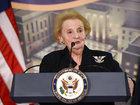North Korea test-fired a suspected long-range missile toward the sea Thursday, its neighbors' militaries said. The launch, which extended North Korea's barrage of weapons tests this year, came after the U.S. and South Korean militaries said the country was preparing a flight of its biggest-yet intercontinental ballistic missile.
South Korea's Joint Chiefs of Staff didn't immediately say whether the weapon involved in the launch was ballistic or how far it flew. But Japan's Vice Defense Minister Makoto Oniki said the missile, which reached a maximum altitude of 6,000 kilometers (3,728 miles), was possibly a new type of ICBM.
 Full Story
Full Story
Ukraine President Volodymr Zelenskyy called on people worldwide to gather in public Thursday to show support for his embattled country as he prepared to address U.S. President Joe Biden and other NATO leaders gathered in Brussels on the one-month anniversary of the Russian invasion.
"Come to your squares, your streets. Make yourselves visible and heard," Zelenskyy said in English during an emotional video address late Wednesday that was recorded in the dark near the presidential offices in Kyiv. "Say that people matter. Freedom matters. Peace matters. Ukraine matters."
 Full Story
Full Story
Hundreds of searchers wearing rubber boots and full rain gear headed into muddy, forested hills in southern China on Thursday to try to find the second black box from a China Eastern passenger jet that crashed in southern China with 132 people on board earlier this week.
Three days after the crash, larger pieces of debris were reported found for the first time, including engine components and a white wing section with the red and blue China Eastern logo on it, state broadcaster CCTV said.
 Full Story
Full Story
Madeleine Albright, a child refugee from Nazi- and then Soviet-dominated Eastern Europe who rose to become the first female secretary of state and a mentor to many current and former American statesmen and women, died Wednesday of cancer, her family said. She was 84.
A lifelong Democrat who nonetheless worked to bring Republicans into her orbit, Albright was chosen in 1996 by President Bill Clinton to be America's top diplomat, elevating her from U.S. ambassador to the United Nations, where she had been only the second woman to hold that job.
 Full Story
Full Story
A group of Dutch historians has published an in-depth criticism of the work and conclusion of a cold case team that said it had pieced together the "most likely scenario" of who betrayed Jewish teenage diarist Anne Frank and her family.
The cold case team's research, which was published early this year in the book "The Betrayal of Anne Frank: A Cold Case Investigation," by Canadian academic and author Rosemary Sullivan, immediately drew criticism in the Netherlands.
 Full Story
Full Story
The European Union's executive arm proposed Wednesday that all natural gas storage facilities in the 27-nation bloc are topped up to at least 80% capacity for next winter as it seeks to reduce its reliance on Russian energy in the future.
On the eve of a two-day summit of EU leaders, the European Commission said the bloc must quickly revamp its energy policy before next winter and another price crisis leaves millions of EU citizens with bills they cannot pay.
 Full Story
Full Story
At 37 years old, it's no secret time is running out for Cristiano Ronaldo.
Playing at a high level is not getting any easier, and the opportunities to compete in top tournaments are becoming scarce.
 Full Story
Full Story
The Egyptian pound slipped further against the dollar on Wednesday, after Egypt's Central Bank raised its main interest rate and devalued the local currency by 14%.
The moves by the Central Bank of Egypt were meant to combat inflationary waves triggered by the coronavirus pandemic and Russia's war in Ukraine, which hiked oil prices to record highs.
 Full Story
Full Story
The chief of the United Nations announced a project Wednesday to put every person on Earth in range of early weather-warning systems within five years as natural disasters have grown more powerful and frequent due to climate change.
U.N. Secretary-General Antonio Guterres said the project with the Geneva-based World Meteorological Organization aims to make the alert systems already used by many rich countries available to the developing world.
 Full Story
Full Story
As Morocco withers under its worst drought in 40 years, experts warn that a combination of climate change and bad resource management could trigger severe drinking water shortages.
"The country hasn't seen a situation like this since the start of the 1980s," said water policy expert Abderrahim Hendouf.
 Full Story
Full Story



